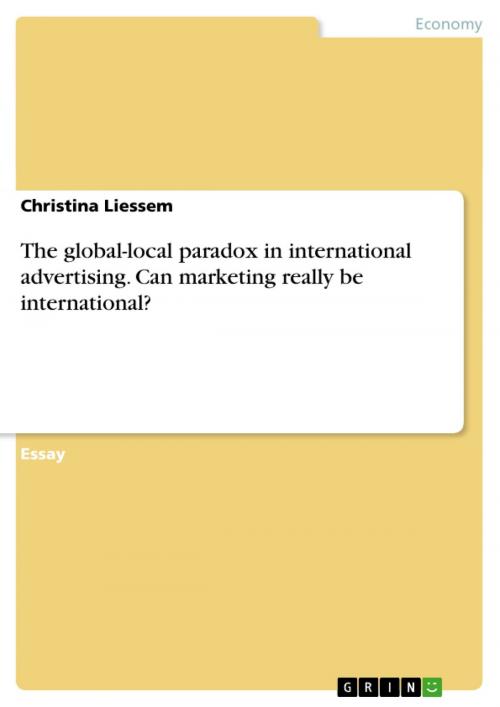The global-local paradox in international advertising. Can marketing really be international?
Business & Finance, Marketing & Sales| Author: | Christina Liessem | ISBN: | 9783656852414 |
| Publisher: | GRIN Verlag | Publication: | December 2, 2014 |
| Imprint: | GRIN Verlag | Language: | English |
| Author: | Christina Liessem |
| ISBN: | 9783656852414 |
| Publisher: | GRIN Verlag |
| Publication: | December 2, 2014 |
| Imprint: | GRIN Verlag |
| Language: | English |
Essay from the year 2011 in the subject Business economics - Marketing, Corporate Communication, CRM, Market Research, Social Media, grade: 74%, Queen Mary University of London (Business School), course: International Marketing Communications, language: English, abstract: The debate around standardization versus adaptation in international marketing consists since nearly half a decade now. Usunier and Lee (2009) believe that international marketing cannot be global and refer to it as intercultural marketing. De Mooij (2010:3) states that people think and act based on their inherent framework, given them by their culture and national belonging. Even if they try to think different, they will still see it out of their own cultural perspective. In de Mooij's opinion this leads to the paradox that people are not able to think global, but furthermore see and judge their world always according to their own framework, even if they might believe they think global. In the marketing context this would mean that international marketing cannot be global. Marketers will always use their own cultural system to create advertising for other cultures, which apparently cannot be successful there. Nevertheless the debate is still in the centre of attention in international marketing. Neither academicians nor practitioners were able to give a coherent answer to the question, if global advertising can be successful or if advertising has to be adapted to local circumstances. Agrawal (1995) points out the waves of changes between adaptation and standardization advertising strategies used by practitioners between the 1950's and the 1980's. Simultaneously, 'academicians in contrast have generally been consistent in advocating the adaptation approach and/or the contingency approach' (Agrawal, 1995:44). These results indicate that the global advertising cannot easily be doomed as an unsuccessful strategy. This essay provides a critical review over the debate standardization versus adaptation in international marketing. Additionally case examples from German companies will be introduced to support the argumentation.
Essay from the year 2011 in the subject Business economics - Marketing, Corporate Communication, CRM, Market Research, Social Media, grade: 74%, Queen Mary University of London (Business School), course: International Marketing Communications, language: English, abstract: The debate around standardization versus adaptation in international marketing consists since nearly half a decade now. Usunier and Lee (2009) believe that international marketing cannot be global and refer to it as intercultural marketing. De Mooij (2010:3) states that people think and act based on their inherent framework, given them by their culture and national belonging. Even if they try to think different, they will still see it out of their own cultural perspective. In de Mooij's opinion this leads to the paradox that people are not able to think global, but furthermore see and judge their world always according to their own framework, even if they might believe they think global. In the marketing context this would mean that international marketing cannot be global. Marketers will always use their own cultural system to create advertising for other cultures, which apparently cannot be successful there. Nevertheless the debate is still in the centre of attention in international marketing. Neither academicians nor practitioners were able to give a coherent answer to the question, if global advertising can be successful or if advertising has to be adapted to local circumstances. Agrawal (1995) points out the waves of changes between adaptation and standardization advertising strategies used by practitioners between the 1950's and the 1980's. Simultaneously, 'academicians in contrast have generally been consistent in advocating the adaptation approach and/or the contingency approach' (Agrawal, 1995:44). These results indicate that the global advertising cannot easily be doomed as an unsuccessful strategy. This essay provides a critical review over the debate standardization versus adaptation in international marketing. Additionally case examples from German companies will be introduced to support the argumentation.















